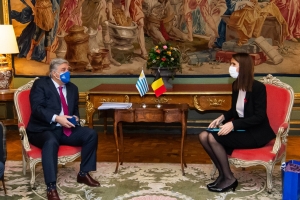Sophie Wilmès addresses the UN Security Council as Belgium enters the last month of its mandate
At the end of December, Belgium will complete its two-year term on the UN Security Council, the sixth since the creation of the UN in 1945. Several important files for Belgium's foreign policy will be on the agenda in the last weeks of this mandate.
Iran and Democratic Republic of Congo/MONUSCO
Belgium, as facilitator of resolution 2231 (which approved the July 2015 nuclear agreement between Iran and the 'P5+1' group composed of China, the United States, France, the United Kingdom, Russia and Germany), will present its latest semestrial report to the Council. The mandate of the UN Stabilization Mission in the Democratic Republic of Congo (DRC), MONUSCO, will have to be renewed.
Children and Armed Conflict
Belgium will work to finalize the conclusions of the Security Council on the issue of 'Children in times of Armed Conflict', which should help to better resolve this problem on the ground, for example in Nigeria, the Philippines, the DRC and Mali. This is a concrete result of our mandate as Chair of the Security Council Working Group(link is external) on Children and Armed Conflict. As a testimony of its strong involvement on this issue, Belgium will also organize a (virtual) event on December 9 on the role of UN peace operations in the field of child protection.
On 3 and 4 December, Deputy Prime Minister and Minister of Foreign Affairs Sophie Wilmès will address the Security Council on the occasion of two high-level debates on security sector reform and on cooperation between the African Union (AU) and the United Nations, organized by South Africa. Due to the health situation, the debates will take place virtually.
Security sector reform, a crucial issue
Security sector reform is a critical issue because it lays the foundation for sustainable peace, which is why it is important for UN peacekeeping operations. It covers a broad spectrum of activities not limited to the military but also includes police, justice, border management and customs.
During the debate on security sector reform, Minister Wilmès will insist on the importance of respect for human rights, the rule of law and the involvement of every component of society in these processes. She will reaffirm Belgium's support for the importance of this issue, as illustrated by our active participation in EU training and capacity-building missions in the Sahel, the Central African Republic and Iraq in particular, in parallel with our contributions to UN peacekeeping operations. For Minister Wilmès, a strengthening of coordination between international organizations involved in security sector reform should be envisaged in order to identify synergies and promote the sharing of experiences.
Cooperation between the African Union and the United Nations
This strengthening of cooperation between international organizations will also be part of the messages Minister Wilmès intends to address during the debate on the partnership between the AU and the UN. Sophie Wilmès will salute the efforts made within the framework of this collaboration which was institutionalized 12 years ago and will mark her support to the AU in the pursuit of these efforts.
However, the efforts and successes achieved, particularly with regard to the health crisis, cannot overshadow the improvements needed to strengthen this collaboration, whether institutional or thematic. The Minister will also stress the importance of transitional justice in the work of the AU. It is a necessary element in addressing past human rights violations with a view to promoting reconciliation within society and to leading to the establishment of the rule of law and democracy.
Belgium will also welcome the enhanced role of the AU in promoting a positive regional dynamic in Central Africa, as well as the DRC's chairmanship of the African Union in 2021. Complementarity between the AU and subregional organizations, on one hand, and between the AU and the UN, on the other hand, is essential for the necessary elaboration of solutions that respect local specificities.

